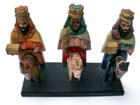|
 |
|
Esta página no está disponible en español. THE ORLANDO SENTINEL The Royal Treatment By Denise Bates Enos | Special to the Sentinel November 28, 2004  Three Kings Day. (BRADLEY LOGAN/ORLANDO SENTINEL) Three Kings Day. (BRADLEY LOGAN/ORLANDO SENTINEL)
Although many people strip the Christmas tree and put away the decorations shortly after Dec. 25, some people keep the trimmings intact until Jan. 6. That's the day the Roman Catholic Church celebrates the Feast of the Epiphany. Epiphany, or Three Kings Day, is traditionally the day that the Three Wise Men found their way to the manger to pay homage to the baby Jesus. In Puerto Rico and other Hispanic cultures, the Wise Men are known as the Three Kings and are welcomed with a shoebox full of grass for their camels -- or the horses they're often depicted riding in Hispanic renditions of the story. Good boys and girls place the boxes under their beds the evening of Jan. 5, occasionally accompanying them with bowls of water for the thirsty animals, and they find the grass replaced with gifts the next morning. Before the commercialized Christmas craze fully took hold in Puerto Rico a few decades ago, the island commonwealth placed greater emphasis on the Feast of the Epiphany. That was the day children eagerly awaited gifts from the Three Kings, Balthasar, Gaspar (or Caspar) and Melchior. Kissimmee resident Judith Magali Rojas, president of the Puerto Rican Cultural Center of Florida, brought the custom with her when she moved from the island to the States 15 years ago. "In my house, we always celebrate Three Kings Day," she says. "It's important to pass the cultural traditions to the children." Rojas says one of the biggest challenges she has encountered while trying to decorate for Three Kings Day is finding Wise-Men figurines. "We always include the Three Kings in our nacimiento [nativity scene], but I can never find a set that includes them," she says. "I always have to buy them separately." Some Hispanic families will set up the nativity without the baby Jesus figure or the Three Kings, adding them to the scene on Dec. 25 and Jan. 6, respectively. For Rojas, celebrating the holiday is more than a matter of decor. "The Three Kings are part of our folklore," she says, "and we don't want to lose our roots."
|
